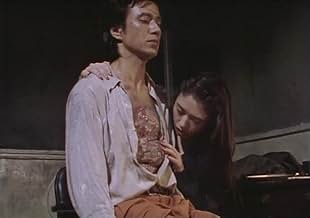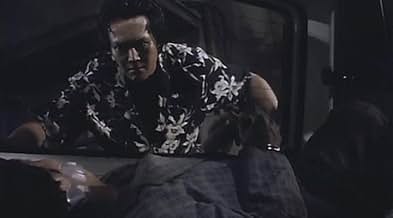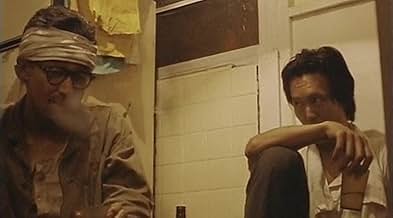Two police detectives Numata and Tosaka infiltrate a group of underground black market human organ dealers. Things go haywire during a raid on the group's surgical headquarters.Two police detectives Numata and Tosaka infiltrate a group of underground black market human organ dealers. Things go haywire during a raid on the group's surgical headquarters.Two police detectives Numata and Tosaka infiltrate a group of underground black market human organ dealers. Things go haywire during a raid on the group's surgical headquarters.
- Director
- Writer
- All cast & crew
- Production, box office & more at IMDbPro
Featured reviews
okay, I'm not going to even try to explain the plot of this unique film... instead i will say that "Organ" can honestly be considered one of the strangest, yet also most beautifully crafted, movies that i have ever had the pleasure of setting eyes on. Some will say that the director was just trying to use the back-story as an excuse to showcase graphic violence and gore in an attempt to gross-out and shock the viewer... but this is the furthest thing that i can conceive as being possible. Yes it is extremely graphic in it's depiction of the twisted inner-workings of the human soul, but the gist of the fact is that the director was trying to depict (or at least in my interpretation...) just that... that humans can be sick and perverse... even those who have been deemed to be social leaders. Granted, the first time you view this film, you may get lost. Between all the blood, violence, and distorted dream-like imagery you are sure to become at least a little confused (especially those of us who do not speak Japanese and are held captives to the subtitles). But upon subsequent viewings, i believe you will find that the story represents a masterful vision of the contrast of the conflicting sides of human personalities... even those of us who are trying to do good are not always saints... every man has his own dark side to him. Just please give this film a chance, and try not to be intimidated by the subject matter within. Instead, just allow yourself to take in all of the sights, sounds, images, and metaphors that are rooted so firmly in this film... and try not be overwhelmed... no matter how hard that may be... and i think you will find "Organ" to be as engrossing as I did.
I just watched this movie last night, and I didn't understand it until I read the Mondo Macabro entry on it by Pete Tombs, and some of the reviews here (evidently, I'm not alone in thinking this film loses power by sacrificing narrative clarity for thematic integrity). The fact that the film is low budget and shot in 16mm (somewhat grainy; it would be great to see a Blu-Ray version with better subtitles) adds to the viewer's frustration. Still, Kei Fujiwara has undoubtedly created a nightmarish alternate universe and managed to get it on film which is at least worth five stars.
Organ is really more of an avant garde art film than straight horror, but then again, if you watch a lot of Japanese horror, you've probably noticed that this island culture takes the genre more seriously than in the west (which tends to see it as a more exploitive, money-making, freshman-director type genre). I can't say I enjoyed watching Organ much, but I do respect the director's unflinching vision and daring in bringing such a brutally dark tale to fruition.
Organ is really more of an avant garde art film than straight horror, but then again, if you watch a lot of Japanese horror, you've probably noticed that this island culture takes the genre more seriously than in the west (which tends to see it as a more exploitive, money-making, freshman-director type genre). I can't say I enjoyed watching Organ much, but I do respect the director's unflinching vision and daring in bringing such a brutally dark tale to fruition.
10myboigie
I'm astonished at some of the bad-reviews of this film--ignore them. If you love extreme cinema that explores the basis of the human-animal, you have found a home in the cinematic space-time continuum. Ostensibly, this is a Yakuza and detective film, with elements of film-noir and expressionism. It is not a purely genre film at-all, but an art-film with incredible complexity about what it is to be human. Fujiwara is best-known for her role in Tsukamoto Shinya's "Tetsuo: the Iron Man", and her relationship to his work shows here. The human-body is the battlefield, as well as the human-soul. Maybe it took an inspired woman to say this, and a Buddhist at-that. And in many-ways, this feels like a tale by Edgar Allan Poe! It has that feel to it, a very visceral, filth-covered psychology--what much real horror is. In-fact, I'd say it is on-par with Poe and his Japanese-analogue, "Edogawa Rampo" (a pen-name). This is a film I have watched several-times, and it always delivers a new-revelation. One-viewing is not enough to begin to understand it. If it is ugly, it is because life has ugliness. If it has beauty (it does), it is because life does.
There are roughly two narrative-paths in the film: first, the story of the outsider detective searching for his "dead" partner after their uncovering of a horrific black-market organ-smuggling ring run by Yakuza, and secondly, the story of the insiders of the ring, a brother-and-sister. The detective's-half reminded me strongly of Kurosawa's "Stray Dog" (aka "Nora Inu", 1949), and is probably a conscious-nod by Fujiwara. The brother has reanimated the lost-cop and is doing hellish experiments on him, while the sister--Yoko--runs the gang and fends-off the outside world. It's an interesting structure, which makes the film watchable numerous times, but the philosophical-themes of birth-and-death are even more rewarding. Yes, it is extremely low-budget, and shot in 16mm, but it is a well-executed film by a genuine maverick.
At the film's philosophical-center is the relationship with the surgeon-brother in the organ-ring, and the reanimated-cop. As grotesque as the half-dead cop appears, he is more human than the internally-diseased brother. In-fact, he is metaphor for the surgeon's remnants of humanity; Fujiwara makes it clear that the brother and sister were horribly-abused, the origin of their spiritual-decay and sadism. The reanimated-cop is hidden-away by the surgeon in a secret room, and they have an "internal-dialog." The other-half of the narrative is also very powerful, with the outsider detective's obsession with finding his partner taking a horrible-toll on his family. It seems that being a cop hasn't done him or his home any good--even before the body-snatching incident. Fujiwara paints life as-such: birth, mutilation at the hands of others, and finally, death. Sadly, this is the fate that awaits many human-beings in this inhuman era we inhabit. Out of this, one could surmise that Mrs. Fujiwara has a strong-ambivalence to motherhood. What is puzzling is why many women do not. This film is a contemporary-masterpiece. "Organ 2" has been completed, so expect more-of-the-same!
01.21.06 PS: It's hilarious how people don't get this incredible-film, but I believe it is still ahead-of-the-pack. American-audiences are used to a more linear-narrative structure, whereas audiences in Japan and Europe understand a film that is primarily thematic.
There are roughly two narrative-paths in the film: first, the story of the outsider detective searching for his "dead" partner after their uncovering of a horrific black-market organ-smuggling ring run by Yakuza, and secondly, the story of the insiders of the ring, a brother-and-sister. The detective's-half reminded me strongly of Kurosawa's "Stray Dog" (aka "Nora Inu", 1949), and is probably a conscious-nod by Fujiwara. The brother has reanimated the lost-cop and is doing hellish experiments on him, while the sister--Yoko--runs the gang and fends-off the outside world. It's an interesting structure, which makes the film watchable numerous times, but the philosophical-themes of birth-and-death are even more rewarding. Yes, it is extremely low-budget, and shot in 16mm, but it is a well-executed film by a genuine maverick.
At the film's philosophical-center is the relationship with the surgeon-brother in the organ-ring, and the reanimated-cop. As grotesque as the half-dead cop appears, he is more human than the internally-diseased brother. In-fact, he is metaphor for the surgeon's remnants of humanity; Fujiwara makes it clear that the brother and sister were horribly-abused, the origin of their spiritual-decay and sadism. The reanimated-cop is hidden-away by the surgeon in a secret room, and they have an "internal-dialog." The other-half of the narrative is also very powerful, with the outsider detective's obsession with finding his partner taking a horrible-toll on his family. It seems that being a cop hasn't done him or his home any good--even before the body-snatching incident. Fujiwara paints life as-such: birth, mutilation at the hands of others, and finally, death. Sadly, this is the fate that awaits many human-beings in this inhuman era we inhabit. Out of this, one could surmise that Mrs. Fujiwara has a strong-ambivalence to motherhood. What is puzzling is why many women do not. This film is a contemporary-masterpiece. "Organ 2" has been completed, so expect more-of-the-same!
01.21.06 PS: It's hilarious how people don't get this incredible-film, but I believe it is still ahead-of-the-pack. American-audiences are used to a more linear-narrative structure, whereas audiences in Japan and Europe understand a film that is primarily thematic.
Well, the first thing about Organ is, that you should not try to understand the storyline too much. This movie is extra-strange yet lives of its trashy and bizarre pictures. If you like purulent ulcerations exerbating and real weird erotics - it is the real thing for you. Don't expect a pure splatter movie but a picture with intense horror... To the story (as well as I can tell it): a biologist with a big mutation (spicy) cuts out organs from dead and alive people to sell them. After locking up the brother of a cop (whom he cuts off his limbs and letting him alive for unknown purposes) he is chased by the cop. And that's it...the rest evolves... Now to the effects: real cool sometimes, but also trashy and funny, butterfly collections, birthings, slimy blood-dripping...yet not state-of-the-art. Nice soundtrack also. For a conclusion, it's a real bizarre japanese splatting horror movie you should not miss if you want it different. I rate it a 7 of 10, but it has deserved a 10 for cult-factor.
For the first half, I was actually enjoying this quite a bit. I appreciated the gore (the hallucinatory sequence of one of Saeki's victims emerging from a cocoon-like object is easily the highlight to the film's gore) and found some of the disturbing bits to the film quite promising. For instance, Saeki having a secret room in his school office where dead and mutilated bodies were stored (Numata's brother, for instance) was a disturbing concept. I also found Numata's investigation of the gang compelling since it came with emotional stakes. For the first half of the film, I was on board with the film and eager to see how everything could culminate. Unfortunately though, somewhere around the halfway point, the film gets increasingly harder to follow. With so many characters and motivations being added, it became more and more difficult to keep track of who was who and what the motivations of everyone was. Eventually, many scenes in the second half made me ask "Where did this come from?" repeatedly. This culminated in a messy and ponderous final act which took all kinds of confusing fates to the various characters and crammed them into each other in a very unpleasant way. The final fight in Saeki's school office was horrendously messy, in particular. Also, while I enjoyed the gore at first, it didn't ramp up as the film went on and eventually got to a point where I kept asking "Didn't they already repeat a similar effect several times?" as I watched it. So yeah, just a big letdown overall. I wouldn't quite call it a bad film though as the first half contained enough potential to prevent it from being a complete waste of time and, in spite of what I said about the second half, there were a few promising moments thrown into the mix (that was few and far between though) that gave me brief breaks from the second half's mostly ponderous tone.
Did you know
- ConnectionsReferences La Mouche (1986)
- How long is Organ?Powered by Alexa
Details
Contribute to this page
Suggest an edit or add missing content




















